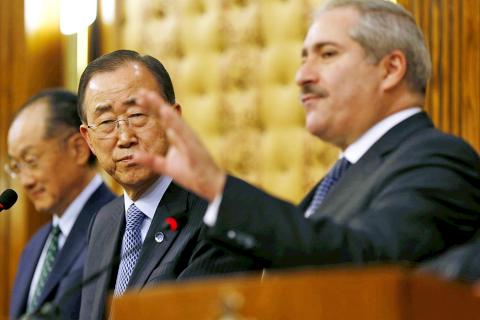Jordan is to get a cheap US$100 million loan to help create 100,000 jobs for Syrian refugees and its own citizens, the World Bank president said on Sunday.
The long-term loan, almost interest free, is part of an attempt by the international community to improve conditions for refugees in overburdened regional host countries, including Jordan and Lebanon.
More than 4.8 million Syrians have fled their country since the start of the Syria conflict in 2011. Jordan hosts about 640,000 registered Syrian refugees and Lebanon more than 1 million.

Photo: Reuters
Cheap loans by the World Bank and other donors are among the new tools meant to help finance education and job creation for refugees in the region. Such support is also meant to slow the migration of refugees to Europe.
World Bank president Jim Yong Kim and UN Secretary-General Ban Ki-moon have been visiting the region since last week, first stopping in Lebanon.
Kim announced the US$100 million loan for job creation in Jordan on Sunday, after Lebanon was also awarded US$100 million to ensure universal school enrollment for Lebanese and Syrian refugee children by next year.
The bank president said the money for Jordan and Lebanon — both middle-income countries — is from a special fund normally reserved for the poorest countries.
“We are taking money from that fund and giving it to a middle-income country because Jordan has taken such extraordinary measures in hosting refugees,” he said.
Kim did not say how soon the 100,000 jobs could be created and how many of them would go to refugees. Jordan has set aside special economic zones where it hopes improved trade arrangements with Europe might lead to greater investment and eventually more jobs. However, the trade arrangements have not yet been worked out and the entire job creation scheme is expected to take several years.
The idea of concessional loans was part of a package of support for refugees and their hosts announced at a Syria aid conference last month.
Eventually, the World Bank and other donors hope to offer US$3 billion to US$4 billion in cheap loans to refugee host countries, with international donors buying down interest.

RUN IT BACK: A succesful first project working with hyperscalers to design chips encouraged MediaTek to start a second project, aiming to hit stride in 2028 MediaTek Inc (聯發科), the world’s biggest smartphone chip supplier, yesterday said it is engaging a second hyperscaler to help design artificial intelligence (AI) accelerators used in data centers following a similar project expected to generate revenue streams soon. The first AI accelerator project is to bring in US$1 billion revenue next year and several billion US dollars more in 2027, MediaTek chief executive officer Rick Tsai (蔡力行) told a virtual investor conference yesterday. The second AI accelerator project is expected to contribute to revenue beginning in 2028, Tsai said. MediaTek yesterday raised its revenue forecast for the global AI accelerator used

Taiwan Semiconductor Manufacturing Co (TSMC, 台積電) has secured three construction permits for its plan to build a state-of-the-art A14 wafer fab in Taichung, and is likely to start construction soon, the Central Taiwan Science Park Bureau said yesterday. Speaking with CNA, Wang Chun-chieh (王俊傑), deputy director general of the science park bureau, said the world’s largest contract chipmaker has received three construction permits — one to build a fab to roll out sophisticated chips, another to build a central utility plant to provide water and electricity for the facility and the other to build three office buildings. With the three permits, TSMC

TEMPORARY TRUCE: China has made concessions to ease rare earth trade controls, among others, while Washington holds fire on a 100% tariff on all Chinese goods China is effectively suspending implementation of additional export controls on rare earth metals and terminating investigations targeting US companies in the semiconductor supply chain, the White House announced. The White House on Saturday issued a fact sheet outlining some details of the trade pact agreed to earlier in the week by US President Donald Trump and Chinese President Xi Jinping (習近平) that aimed to ease tensions between the world’s two largest economies. Under the deal, China is to issue general licenses valid for exports of rare earths, gallium, germanium, antimony and graphite “for the benefit of US end users and their suppliers

Dutch chipmaker Nexperia BV’s China unit yesterday said that it had established sufficient inventories of finished goods and works-in-progress, and that its supply chain remained secure and stable after its parent halted wafer supplies. The Dutch company suspended supplies of wafers to its Chinese assembly plant a week ago, calling it “a direct consequence of the local management’s recent failure to comply with the agreed contractual payment terms,” Reuters reported on Friday last week. Its China unit called Nexperia’s suspension “unilateral” and “extremely irresponsible,” adding that the Dutch parent’s claim about contractual payment was “misleading and highly deceptive,” according to a statement